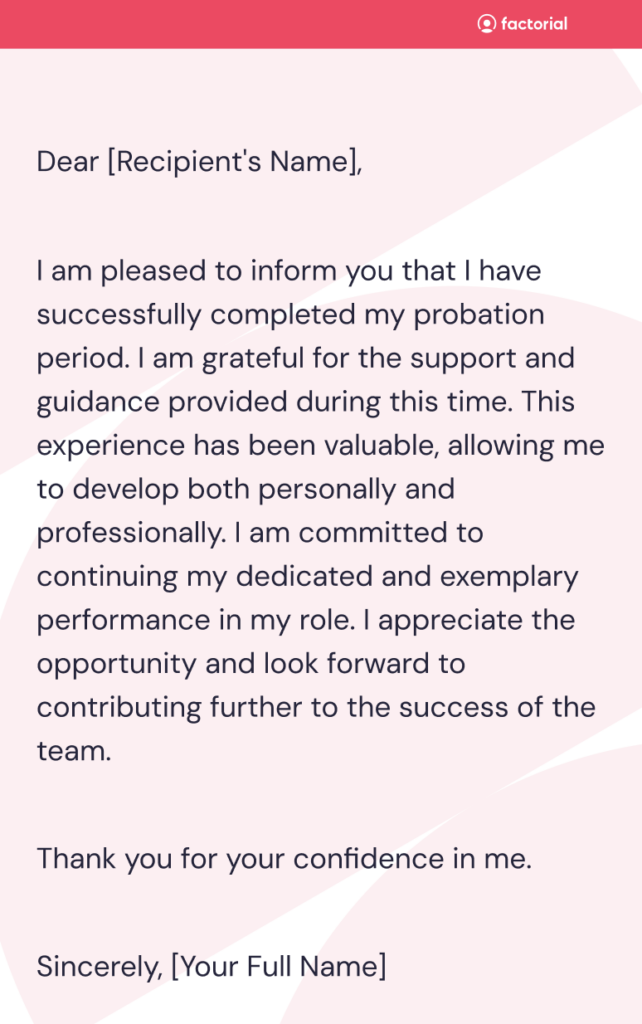A probation period at work, also known as a probationary period, is a vital step in the recruitment process. It enables employers and newly hired employees to determine if they will be a good fit for the company. It is essential that managers understand what probation periods at work are and why they are so important.
In this article, we will cover probationary period meaning, benefits and regulations surrounding probation and notice periods. As well as considerations for when you implement your probationary period policy at your workplace.
What is a Probationary Period?
A probationary period is a fixed period of time during the start of an individual’s employment when they are exempt from certain contractual rights and obligations. Essentially, it is a trial period for both parties to determine if a new employee will be a good match before they are made a permanent member of staff.
The probationary period can last anywhere between two weeks to six months, depending on the terms of the employment contract. During this time, an employee can resign or be dismissed with a reduced notice period if either party determines they are unsuitable for the role.
Although employees have certain statutory employment rights from the first day of employment (such as sick pay), other benefits such as pensions may be withheld until the probation period has been reviewed and reached a satisfactory conclusion.
Why Are Probationary Periods Important?
Probationary periods are effectively an extension of the recruitment process, offering both parties a chance to assess the fit beyond the interview stage. They provide you with an opportunity to evaluate a new starter’s work over an established period of time so that you can be sure they are suitable for the role.
Factors that you should take into consideration during an employee’s probationary period include performance, skills, abilities, attendance, and general conduct. If you don’t offer a probationary period you run the risk of being stuck with an employee who doesn’t meet the expectations of the role and creating potential setbacks.
Probationary periods are also important for employees as they give them a chance to determine if they will be happy working at your company. This is vital as unhappy employees tend to lack motivation and enthusiasm, and this can have a knock-on effect on performance and productivity (not just in terms of the employee in question, but also the impact they have on their colleagues and teammates).
Key Benefits of UK Probation Period for Employers:
As an employer, a probation period allows you to assess and evaluate your new employee thoroughly to ensure their suitability to the role and company. In addition:
- Acts as a safety net: In case your new hire doesn’t meet expectations, your trial period grants you the right to terminate their employment with less hassle.
- Realistic expectations: This time ensures your new hire didn’t embellish their work experience and confirms their knowledge, skills and work-ethic.
Key Benefits of UK Probation Period for Employees:
As an employee, a work probation gives you enough time to understand the work culture and if the company aligns your professional and personal goals.
- Hands-on experience: This trial period also helps you determine whether the workload and responsibilities aligns with your career goals.
- Development: This gives new hires time to scope out if their new company invests in their employees and offers them support in the form of mentors, learnings and trainings.

Probation Periods at Work and What is Employment Law UK?
There are no specific probation period laws in the UK. If you decide to implement a probationary policy then you must make sure it is included in your employment contracts. You should include the following in your probation clause:
- The duration of the probation period.
- Any specific terms relating to notice periods.
- Your discretionary right to extend the probation period.
The length of the probationary period is up to you, but it must be reasonable. If you decide to extend an employee’s probationary period then this also needs to be for justifiable reasons.
In terms of notice periods, UK employment law states that you are obliged to give a minimum of one week’s notice if you decide to terminate an employee’s contract during their probationary period (provided they have been employed for more than 1 month). You also need to make sure you comply with the Equality Act 2010 and that your reasons for dismissal are not discriminatory.
How to Manage Employees During Probationary Period
The following best practices will help you effectively manage your employees during their probation period.
- Design an effective and informative onboarding policy for new recruits. The more information you provide them with, the quicker they will get up to speed.
- Establish clear standards and expectations in terms of performance, conduct, attendance and punctuality.
- Make sure new employees are clear on your company’s core values and performance targets.
- Set measurable targets to measure new employee performance and provide support and guidance where necessary.
- Make sure employees receive enough training to fulfil their duties to the best of their abilities.
- Meet regularly with new employees to discuss their progress and find out how they are settling in. Address any raised issues.
- Communicate any concerns as soon as possible so that they can be rectified.
- Establish a clear schedule for probationary period review meetings, communicate them in advance and ensure to follow-up to maintain consistency.
Employee Rights During the Probationary Period
Employees on probation have the same statutory rights as all other employees. This includes entitlement to the national minimum wage, maximum weekly working hours in line with the Working Time Directive, statutory sick pay, family-related leave, and statutory notice. Employees on probation retain all statutory rights and are also entitled to protection against unfair dismissal and unlawful discrimination.
You are not obliged to provide employees with non-statutory benefits such as pensions, bonuses and enhanced sick pay during their probation period. This is offered at your discretion.
Do You Have to Give Notice During Probationary Period UK?
The first thing to note here is the distinction between contractual and statutory notice. If you have stipulated an agreed probation period notice policy in an employee’s contract of employment then they must comply with it. If you have not defined a notice period in their contract then they must comply with statutory notice requirements (one week’s notice).
The same applies if you choose to terminate the contract of an employee on probation. The only exception to this is if an employee has been with your company for less than one month. In this case, you do not need to give notice (unless you have stated otherwise in their contract).
Can I Dismiss an Employee During Their Probation Period?
You can dismiss an employee at any time during their probationary period if you feel they are not meeting expectations. Before doing so though you should make sure you raise any concerns and provide support where necessary. You can do this during a formal probation review meeting. Be sure to maintain a record of all communications and make sure your reasons for terminating an employee’s contract cannot be construed as unfair dismissal.

What Happens When an Employee’s Probation Period Comes to an End?
Once an employee’s probationary period has come to an end, it’s essential to assess their overall performance and determine the next steps. Will you offer them a permanent position or give them notice of termination? Make sure you have conducted a full review of all aspects of their work. This includes performance, skills, ability to fulfil duties, attendance, punctuality, and conduct.
Once you have made your decision you will need to hold a probationary period review meeting with the employee to discuss the outcome. If the probationary period has been successful then this is the point where you will offer them a permanent contract.
If they have not met your expectations then this is your opportunity to explain what went wrong. Make sure you provide clear examples and be as specific as possible. Provide the appropriate notice and give the employee an opportunity to appeal.
You may decide to offer a probationary period extension if there has not been enough time to make a final decision. If this is the case, then make sure you clearly explain the terms of the extension to the employee. Once the meeting is over, confirm everything in writing so that there is no risk of confusion or dispute.
Probationary Period Review Template
At the end of this period, it’s standard procedure to hold a review meeting to feedback to the employee and announce whether they have passed or the period will be extended. You can use the probationary review template below to guide you!
Probation Period Passed Letter Template
If an employee has excelled during this preliminary period, you can use the below probation period passed letter template to announce their success.
Subject: Probation Successfully Completed
Dear [Recipient’s Name],
I am pleased to inform you that I have successfully completed my probation period. I am grateful for the support and guidance provided during this time. This experience has been valuable, allowing me to develop both personally and professionally. I am committed to continuing my dedicated and exemplary performance in my role. I appreciate the opportunity and look forward to contributing further to the success of the team.
Thank you for your confidence in me.
Sincerely, [Your Full Name]
UK Probation Period FAQs
Can you fail a job probation?
Yes, it is possible to fail a job probation if your performance or conduct does not meet the employer’s expectations.
What if I fail my probation period?
If you fail your probation period, the employer may terminate your employment. They should follow fair and lawful dismissal procedures.
Is a 3-month probation period legal?
Yes, a 3-month probation period is legal in the UK. It is a common duration for probation periods, but it can vary depending on the employer and the job.
What is the purpose of a probation period?
The purpose of a probation period is for the employer to assess the suitability of a new employee and for the employee to demonstrate their skills and capabilities in the job.
Do you get a lower salary during the probation period?
Generally, the salary during the probation period is the same as the agreed upon salary for the job. However, some employers may have specific policies regarding salary adjustments during probation.
Can you apply for jobs while on probation?
Yes, you can apply for jobs while on probation. However, you should be mindful of any contractual obligations and ensure that you manage your time and commitments appropriately.
What is a 3-month probation review?
A 3-month probation review is a formal assessment conducted by the employer at the end of the probation period to evaluate your performance, address any concerns, and determine whether to confirm your employment.
Why do companies extend probation?
Companies may extend probation periods to allow more time for assessing an employee’s performance, providing additional support or training, or to address any specific concerns or issues that have arisen.
What questions should I ask in a probation review?
You can ask about your performance feedback, areas for improvement, training and development opportunities, expectations for the future, and any specific concerns or questions you may have.
Can you be fired during the probation period?
Yes, you can be fired during the probation period if your employer finds your performance or conduct unsatisfactory. However, proper dismissal procedures must be followed.
What is the maximum probationary period?
There is no specific maximum probationary period set by law in the UK. The duration of the probation period is usually determined by the employer and stated in the employment contract or company policy.
What happens if you don’t pass probation?
If you don’t pass probation, your employment may be terminated by the employer. It is important to review the terms of your contract and any applicable policies to understand the specific consequences.
What are the 5 reasons for dismissal?
The five potentially fair reasons for dismissal in the UK are capability or performance, conduct, redundancy, a legal restriction, or some other substantial reason (e.g., breakdown of trust).
What is the notice period after probation?
The notice period after probation can vary depending on the terms of the employment contract. It is usually longer than the notice period during probation but should be clearly stated in the contract.
What happens after a 3-month probation period?
After a 3-month probation period, the employer typically conducts a review and decides whether to confirm your employment. If confirmed, you continue working in the role without the probationary status.
Is a 12-month probationary period normal?
A 12-month probationary period is less common and generally considered to be on the longer side. Most probation periods in the UK range from three to six months, but the duration can vary by employer.
Can a company put you back on probation?
Yes, in certain circumstances, a company may put an employee back on probation if they have been absent from work for a significant period or if they have been rehired for a different role or department.
What is wrongful dismissal?
Wrongful dismissal refers to a situation where an employer terminates an employee’s contract in breach of its terms, such as not providing proper notice or not following the correct dismissal procedures.
Should a probation period be in the employment contract?
Yes, it is advisable for the terms of the probation period to be clearly stated in the employment contract. This helps establish the expectations, rights, and responsibilities of both the employer and the employee.



